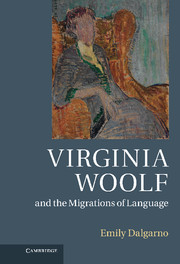Book contents
- Frontmatter
- Contents
- Preface
- Abbreviations
- The migrations of language: introduction
- Chapter 1 Translation and ethnography in “On Not Knowing Greek”
- Chapter 2 Antigone and the public language
- Chapter 3 Tolstoy, Dostoyevsky, and the Russian soul
- Chapter 4 Proust and the fictions of the unconscious
- Chapter 5 Translation and iterability
- Chapter 6 Assia Djebar and the poetics of lamentation
- Conclusion
- Bibliography of works cited
- Index
- References
Chapter 5 - Translation and iterability
Published online by Cambridge University Press: 07 October 2011
- Frontmatter
- Contents
- Preface
- Abbreviations
- The migrations of language: introduction
- Chapter 1 Translation and ethnography in “On Not Knowing Greek”
- Chapter 2 Antigone and the public language
- Chapter 3 Tolstoy, Dostoyevsky, and the Russian soul
- Chapter 4 Proust and the fictions of the unconscious
- Chapter 5 Translation and iterability
- Chapter 6 Assia Djebar and the poetics of lamentation
- Conclusion
- Bibliography of works cited
- Index
- References
Summary
A text lives only if it lives on [sur-vit], and it lives on only if it is at once translatable and untranslatable.
Jacques Derrida, “Living On: Border Lines,” Deconstruction and Criticism (1979), 102It would be misleading to conclude that the impact of translation on Woolf’s language was of interest only to readers in the English-language community. The overall argument of this book would not be complete without some study of foreign writers who share her sense that translation in postcolonial culture resists what Bakhtin has called the centralizing tendency of European languages, in order to create a space that is defined by crossing borders. In the process translators abandon a commitment to accuracy in order to accommodate the historical contingency of the sign. Scenes from several of Woolf’s novels play out the social consequences of Derrida’s “iterability,” that is the sign read in the absence of either the sender or the receiver. In such circumstances the translation becomes heuristic, in the sense that it sends the reader back to interpret the relationship between or among texts.
The distinguishing features of Woolf’s vision of translation emerge most distinctly in the perspective of European writers whose experience of nations and nationality was diasporic. In her work we see that moving a text into a different language and culture asks new questions and creates a new reader. In my reading, a sentence or two hitherto unexamined in one of her paragraphs makes theoretical sense when read in the context of European discourses of translation. The striking difference is that whereas Walter Benjamin and Jacques Derrida assumed the institutional position of translator-as-heir, as a British female Woolf occupied a different position. Although her family legacy and her position as a co-founder of the Hogarth Press are the marks of social authority, one has only to recall the role of entail in the fortunes of Vita Sackville-West to realize how contingent was the agency of a female in matters of inheritance. In such a split position Woolf emphasized instead the changing role of the reader, and translation as a linguistic activity with specific results for language and culture. In effect she shifted the discourse from an ethnographic emphasis on translation and filiation, to her observations of the way that translation alienates one’s own language, and in so doing she raised an entirely different set of questions.
Information
- Type
- Chapter
- Information
- Virginia Woolf and the Migrations of Language , pp. 133 - 155Publisher: Cambridge University PressPrint publication year: 2011
